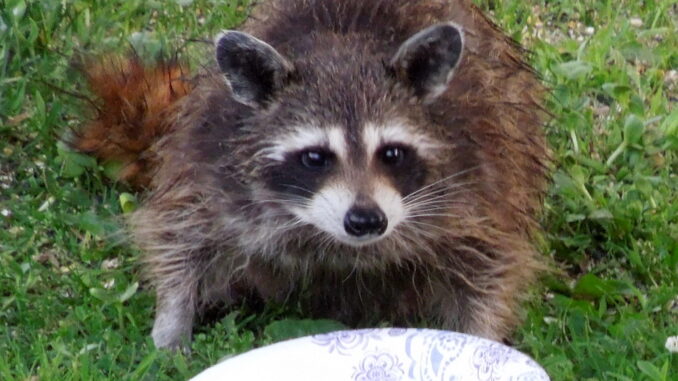
Do raccoons eat sunflower seeds? Yes, they do! Raccoons, enjoy munching on sunflower seeds. These seeds, often set out for birds, become a tasty treat for raccoons too.
Raccoons are opportunistic eaters, known to consume a diverse range of foods. Their diets include fruits, vegetables, insects, small mammals, and, of course, whatever they can find in human habitats. Sunflower seeds, being a popular snack for many people, are often readily available in urban areas, making them potential targets for these resourceful foragers.
Table of Contents
Do Raccoons Eat Sunflower Seeds?
Observations from wildlife experts and anecdotal evidence suggest that raccoons do indeed have a liking for sunflower seeds. The seeds’ small size and high-fat content make them an attractive and energy-dense snack for them.
Raccoons may eat sunflower seeds for several reasons:
- High Nutritional Value: Sunflower seeds are rich in essential nutrients, including healthy fats, proteins, and various vitamins. Raccoons may consume them as a part of their diet to meet nutritional requirements.
- Energy Source: The high fat content in sunflower seeds provides a quick and concentrated energy source. Raccoons, being opportunistic feeders, may choose sunflower seeds to fulfill their energy needs.
- Easy Accessibility: Sunflower seeds are often easily accessible, especially in bird feeders or areas where people regularly provide seeds. Raccoons, known for their adaptability, take advantage of these readily available food sources.
- Seed Foraging Behavior: Raccoons exhibit natural foraging behavior, and sunflower seeds, being small and manageable, align with their instinctive preference for seeds, nuts, and small fruits.
- Preference for Variety: Raccoons have a varied diet, and they enjoy exploring different food sources. Sunflower seeds add diversity to their diet, contributing to their overall dietary preferences.
- Human-Influenced Habituation: Raccoons can become habituated to human-provided food, including sunflower seeds from bird feeders. If they find a consistent food source in a particular area, they may return regularly, leading to an increased consumption of sunflower seeds.
Should you feed raccoons sunflower seeds?
Feeding raccoons, including sunflower seeds, is generally discouraged. While raccoons may be attracted to sunflower seeds due to their nutritional value and accessibility, providing human-supplied food can lead to negative consequences. Feeding raccoons can contribute to habituation, altered behaviors, overpopulation, and potential conflicts with humans.
Despite acknowledging the potential negatives associated with feeding raccoons, if you still wish to engage in feeding and have the necessary permits, you can incorporate sunflower seeds into a diverse and balanced diet. It’s crucial to avoid creating dependence on a single food source. Offering a variety of foods, such as fruits, vegetables, and nuts, can help mimic their natural diet and promote better health. You can read the full guide on raccoon’s favorite food to get a more comprehensive idea about their diet.
Do raccoon poop with seeds?
Yes, raccoon feces may contain seeds. As omnivores, raccoons have a diverse diet that includes fruits and vegetables, and seeds can pass through their digestive system and appear in their feces.
These seeds have the potential to sprout and grow in new areas. However, it’s essential to handle raccoon feces carefully due to the risk of disease transmission, particularly raccoon roundworm. Protective measures, such as wearing gloves, are recommended when dealing with raccoon feces.
FAQs About Raccoons and Sunflower Seeds
Q1: Are Sunflower Seeds Toxic To Raccoons?
A: No, sunflower seeds are not toxic for raccoons. While consuming them in large amounts might cause stomach issues, sunflower seeds are generally a nutritious and safe snack for raccoons due to their high antioxidant and nutrient content.
Q2: Can baby Raccoons Eat Sunflower Seeds?
A: Yes, baby raccoons can eat sunflower seeds. In their developmental phase, baby raccoons need energy-rich foods, and sunflower seeds provide essential lipids, proteins, and vitamins for their growth.
Q3: Why Do Raccoons Eat Sunflower Seeds?
A: Raccoons benefit from sunflower seeds as they are rich in nutrients, including lipids, carbs, and vitamins. These seeds help raccoons store extra fat, insulating their bodies and maintaining body temperature during winter.
Q4: Do Raccoons Eat Sunflower Seeds With Shells?
A: Yes, raccoons can eat sunflower seeds with shells, but they shouldn’t consume the actual black shells. Consuming the shells in large quantities may cause digestive issues, so raccoons typically extract the edible part and avoid ingesting the indigestible shell.
Q5: Should I allow raccoons to eat sunflower seeds from my bird feeder?
A: It is generally not recommended to intentionally allow raccoons to access bird feeders filled with sunflower seeds. While raccoons may be attracted to the seeds, their presence can lead to issues such as feeder damage, displacement of birds, and habituation to human-provided food. If raccoons are consistently raiding bird feeders, consider implementing raccoon-resistant bird feeders or adjusting feeding practices to minimize unintended interactions with these wildlife species.
Conclusion:
In the realm of raccoon culinary adventures, sunflower seeds do, indeed, seem to have a place. These adaptable creatures, with their omnivorous appetites, may find these tiny treasures a tempting addition to their varied diets
As we marvel at the resourcefulness of raccoons navigating the urban landscape, let’s also strive to appreciate and protect the delicate balance of wildlife interactions in our shared spaces.
